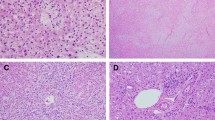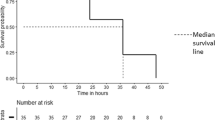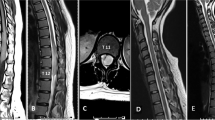Abstract
Tumor lysis syndrome is known among patients undergoing induction therapy for lymphocytic malignancies. Spontaneous tumor lysis in patients with solid tumors is distinctly rare. To our knowledge, the phenomenon of spontaneous tumor lysis has been described only once in infancy, in association with the surgical manipulation of a hepatoblastoma. This is the first report of a newborn with sacrococcygeal teratoma who experienced spontaneous tumor lysis-induced hyperkalemia. Because cardiac arrest may be among the leading causes of operative mortality in babies with sacrococcygeal teratoma, intraoperative monitoring of serum K+ should be conducted frequently.
This is a preview of subscription content, access via your institution
Access options
Subscribe to this journal
Receive 12 print issues and online access
$259.00 per year
only $21.58 per issue
Buy this article
- Purchase on Springer Link
- Instant access to full article PDF
Prices may be subject to local taxes which are calculated during checkout
Similar content being viewed by others
Author information
Authors and Affiliations
Rights and permissions
About this article
Cite this article
Jona, J. Progressive Tumor Necrosis and Lethal Hyperkalemia in a Neonate With Sacrococcygeal Teratoma (SCT). J Perinatol 19, 538–540 (1999). https://doi.org/10.1038/sj.jp.7200197
Published:
Issue Date:
DOI: https://doi.org/10.1038/sj.jp.7200197
This article is cited by
-
Tumor lysis syndrome in premature infant prompting early resection of a large sacrococcygeal teratoma: a case report
BMC Pediatrics (2023)
-
Complications with massive sacrococcygeal tumor resection on a premature neonate
Journal of Anesthesia (2010)
-
Mysterious hyperkalemia and cardiac arrest in a newborn infant undergoing continuous veno-venous hemofiltration dialysis: answer
Pediatric Nephrology (2008)



